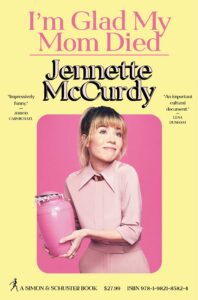
Last month, former actor and child star Jennette Mc Curdy released her memoir “I’m Glad My Mom Died.” If the title wasn’t enough to catch your attention, her story should. Now 30, Jennette became an actor due to her mum’s promptings when she was six. Over time, she became the primary breadwinner for the family when she was cast as a lead actor on Nickelodeon’s hit TV show “iCarly”. In 2013, Jennette’s mum passed away due to cancer, and over the last decade she has been confronted by the pain and complexity of their relationship.
Jennette’s story is complicated – like all our stories are. And her journey through unwanted stardom is overshadowed by eating disorders (which were enforced by her mum), as well as childhood trauma and abuse, familial dysfunction and manipulation, religious trauma, alcohol addiction, and unsafe sexual activity. While most of us can’t relate to Jennette’s time in front of the camera, a lot of us will resonate will parts of her journey.
 Here are three things we can learn from Jennette’s story:
Here are three things we can learn from Jennette’s story:
- Family dysfunction is generational if we don’t identify and break it.
Jennette’s mum was abusive, and controlled every aspect of her daughter’s life from the way she ate, to how she moved, who she saw and what she spent her money on. She was physically invasive, bullied her, hoarded to the detriment of her family’s health and stemmed her daughter’s growth into adulthood. As a consequence, Jennette says she lost her childhood, teen years and her early years as a young adult. While we can’t know all the generational family dynamics in Jennette’s family, interactions with her grandma highlight a similar dysfunction and manipulative relational style that may have been passed down. Narcissistic tendencies are rife, and eventually Jennette literally has to block her grandmother. Jennette’s choice to set boundaries and eventually part ways with her mother emotionally after her death, shows that we can break generational cycles of dysfunction that are toxic and deadly.
- Eating disorders stem from core beliefs about your self and your life
Jennette began calorie restricting when she was 11, after telling her mum she was concerned about growing up and becoming a woman. She desperately wanted to stay a child and hated her body for many years. Calorie counting drew the mother and daughter closer and helped Jennette have some control over her life. It soon turned into Anorexia, however her mum taught her this was desirable, would reprimand her for becoming “chunky”. As a consequence, Jennette would use food to cope with stress, anxiety, grief and pain. Later on, she begins to binge and purge, developing Bulimia. And even when she sees the negative health effects this is having on her mind and body, she doesn’t want to give it up – she feels that she needs this coping mechanism. In the same way, she later stars drinking excessive amounts of alcohol to numb her pain. When Jennette begins therapy and treatment for her ED, she realizes that her need for control, and core beliefs about her worth, body and identity are what drives this destructive behaviour.
- Sheltering your child from topics like puberty and sex can put them at risk
Growing up in a Mormon family, Jennette was taught to save sex for marriage. However, she was not told or taught seemingly anything else about puberty, including her period, consent, sexual attraction, building healthy relationships with others, contraception or how bodies work. When Jennette began romantic relationships with males in her late teens and early twenties, she experienced anxiety, dangerous naivety, and confusion. This would evolve into risk-taking behaviour, purely because Jennette hadn’t been exposed to information, was pressured, or used sex to escape reality. Jennette had to learn as she experienced things. If we teach our children about these things (in an age appropriate way), we can prepare them for adulthood and teach them to love and respect their body and other people.
Do you resonate with Jennette’s story? Do you have a complicated relationship with a parent? Here’s what you need to do: Contact Colleen on 0434 337 245 for a FREE 10 minute consultation on how we can best help you or book online
Leave a Reply